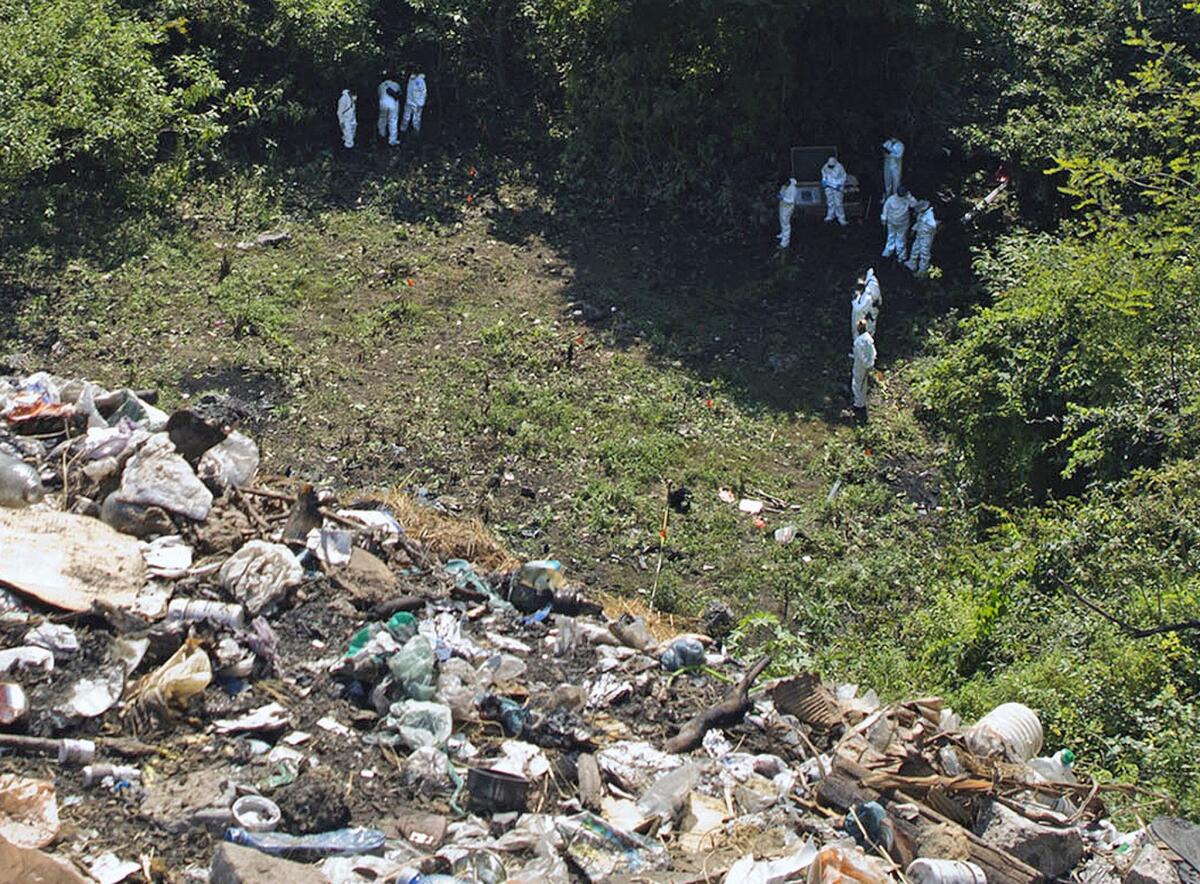Mexico focuses on new mass grave in students’ disappearance

- Share via
Reporting from Iguala, Mexico — Mexican authorities Tuesday announced the arrest of another suspect in the disappearance of 43 college students and said they were working with the most solid clues to date in finding the youths’ whereabouts — centering on a mass grave at a trash dump near the city of Iguala.
The latest arrest brings to 57 the number of people detained in connection with the Sept. 26 incident in which the students were last seen being led away by local police after a clash that killed six people.
Two of the most recently captured suspects confessed to “direct participation” in the disappearances, Mexican Atty. Gen. Jesus Murillo Karam said, without offering details. Their information, he said, led investigators to the dump outside the town of Cocula, about 15 miles southwest of Iguala in rugged, hostile terrain in Guerrero state.
Remains have been found at the site, and Murillo said Mexican forensic specialists, along with a world-renowned team of Argentine experts brought in at the families’ request, are examining them. They hope to determine whether remains are the students — all men whose average age is about 20.
Both Murillo and his lead investigator, Tomas Zeron, went to the Cocula site, fueling speculation that the long search for the students had finally come to an end.
The grave is on a hillside down a shrub-shrouded gravel road in a deep ravine strewn with trash. Forensic experts used ropes to rappel into the area where they searched through debris for bodies.
The burial site is the 11th to be uncovered since the students disappeared. Before exhumation at Cocula, a total of 38 bodies had been recovered, none identified as the students, according to authorities.
Most of the recently detained suspects are members of a drug gang known as Guerreros Unidos, who Mexican authorities say were working hand in hand with local police and politicians. Most of the other detainees are police officers, one of whom confessed to killing or witnessing the killing of several students, Murillo said.
The students, from a rural college for poor children of peasants aspiring to be teachers, went missing after being intercepted and attacked by police from Iguala and Cocula, federal authorities say. The police opened fire on the students’ buses, they say, killing six people, including a 15-year-old soccer player who happened by. The students had commandeered the buses en route to a planned demonstration.
Murillo has previously said Iguala Mayor Jose Luis Abarca ordered the attack on the students, who the mayor feared would disrupt a party his wife was giving. The wife, Maria de los Angeles Pineda, is sister to two major drug-cartel lieutenants, authorities say.
Abarca and Pineda are fugitives. Murillo, speaking to journalists Monday, gave no new information on leads to their whereabouts.
The Iguala case has outraged large segments of Mexican society and exposed, again, the way drug gangs and other criminal networks have penetrated government bodies and police agencies, ending in a collusion of profitable convenience among all concerned. A candlelight march last Wednesday in Mexico City filled central Reforma Boulevard with tens of thousands of students, parents, teachers and supporters and was one of the largest seen in the capital in more than five years.
That demonstration plus the generalized anger led to the forced resignation of Guerrero Gov. Angel Aguirre last week. He was replaced by Rogelio Ortega, an academic who in his earlier years formed part of one of Guerrero’s insurgent movements.
The government of President Enrique Peña Nieto — faced with one of its most serious crises since taking office nearly two years ago — had hoped removing Aguirre would calm tension, but there is no sign of that being the case. Students and supporters have blocked highways and torched government offices in protest.
Follow @TracyKWilkinson on Twitter for news out of Mexico
More to Read
Sign up for Essential California
The most important California stories and recommendations in your inbox every morning.
You may occasionally receive promotional content from the Los Angeles Times.














